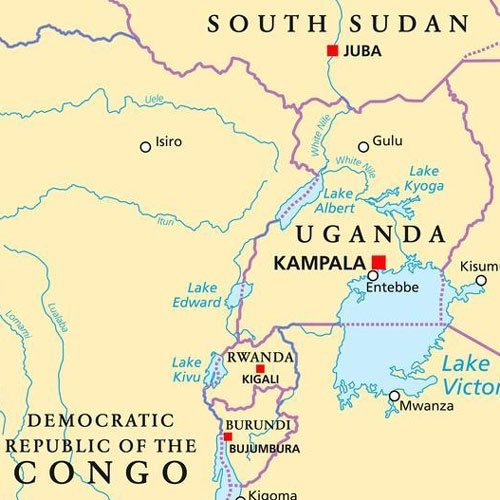Ebola is still wreaking havoc in subequatorial Africa. Only just a month ago, Congo announced that nearly 1,500 of its citizens had died from the Ebola outbreak since August 2018.
Now, the virus has spread across the border to Uganda, as a Congolese-Ugandan family unknowingly brought the virus back to the country with them.
They had previously traveled from Uganda to Congo to care for a relative who was stricken with the disease, but identified no such symptoms in themselves. By the time they returned to Uganda, however, it was too late.
The local authorities now believe that the 5-year-old boy and his grandmother have since died of the virus. The boy’s 3-year-old brother also tested positive and is being kept in isolation in the Bwera treatment unit.
The main problem is that this family, along with many, many others, took a dirt road footpath across the border. It is unknown how many pedestrians cross from country to country at places where there is no official border control. And who knows how many Ugandans have been exposed to Ebola by now. Ugandan health officials are currently following up with 8 people who are suspected to have been in contact with members of this family.
The official border crossing is open 12 hours of the day from 7 a.m. to 7 p.m. and around 800 people cross it daily. Those numbers, of course, grow on market days. But, people continue to cross after dark. They take narrow dirt trodden footpaths called “panyas” in Swahili (“mouse paths” in English).

The two countries have close-knit ties and these footpaths have existed for a long time. Most people have relatives on either side of the border. But as the outbreak rages on, authorities are desperate to get these footpaths of friendship under control. Health workers stress that the border is too porous for them to act effectively.
A Ugandan police officer stationed at the Mpondwe border post shared that they are on high alert and the anxiety can be felt in the air.
The Congo outbreak is the second to worst one so far, with a third of the affected being children. The worst outbreak was the West Africa epidemic that had reverberated the world over from 2014 to 2016. Back then, reportedly over 11,000 people died.
The Democratic Republic of the Congo is generally recognized as an unstable region, with a fledgling infrastructure. This has gone as far as reports testifying that rebels attacked medical centers. Simultaneously, the bulk of the local community is very skeptical of foreign aid and this has hindered the Ebola response work. A survey from 2018 even showed that a significant percentage of interviewees didn’t even think the virus was real. The stigma around it also contributes to hindering the efforts of the World Health Organization, Save the Children, and others.
To top all of this off, this border area is in an active war zone on the Congo side.
This, coupled with the fact that the virus spreads like wildfire, is a recipe for disaster.
All that’s needed to contract the virus is bodily fluid contact with an infected person, and it can be deadly in 90 out of 100 cases. The symptoms include very high fever, and vomiting blood.
The Ministry of Health appealed to the public to stay calm but be vigilant, and to report anyone demonstrating the symptoms. They have assured their citizens that they will contain the disease. They have taken several measures, including leaving out chlorinated water at the border crossings for travelers to wash up with. They also get their temperature taken at the border crossings. Public service announcements are out, advising people not to even shake hands or hug unnecessarily.
Uganda’s first outbreak was back in 2000, where over half of the 425 Ugandans infected died from it. 37 more people died of Ebola in 2007 in a district near the Uganda-Congo border.
There have been immunization attempts in both countries, with an experimental vaccine devised by Merck pharmaceuticals. Sadly, it seems the effectiveness of the vaccine might be tested as soon as — now.
The World Health Organization director-general has pledged to reconvene the emergency committee in Geneva to determine whether the outbreak is bad enough to be of concern to the international community.
An emergency declaration might bring about grave consequences, such as borders closing for travel and trade and air companies aborting their routes.
The Ministry of Health of the Democratic Republic of Congo hopes that this will not happen, as many people depend on the commerce agreements they have with Uganda, as well as Dubai and Kenya.
The battle for an Ebola-free Africa rages on.




